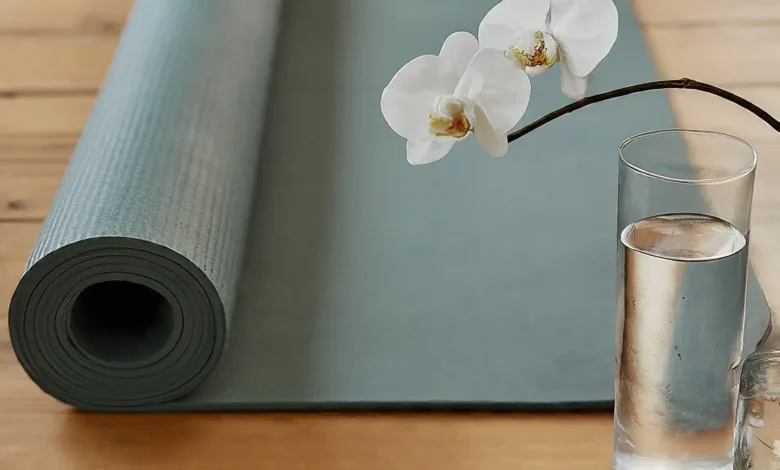Hydration for Mindfulness: Boost Your Meditation with Water

Have you ever felt foggy or unfocused during your meditation practice? The solution might be simpler than you think: water.
Did you know that even mild dehydration can affect your brain function? A study in the journal Nutrients found that just a 1-2% decrease in body water can impair cognitive performance and mood. This highlights the crucial link between hydration and mental clarity.
In this post, we’ll explore how proper hydration can supercharge your mindfulness and meditation practice. We’ll dive into:
- The science behind water and mental clarity
- Practical hydration strategies for mindfulness
- Using water as a focal point in meditation
- Tips for staying hydrated during long sessions
Let’s start by understanding why water is so important for your brain and how it affects your ability to focus and stay present.
The Science Behind Hydration and Mental Clarity
How Dehydration Affects Your Focus
When you don’t drink enough water, your brain doesn’t work at its best. Here are some common signs that dehydration is affecting your mental state:
- Difficulty concentrating
- Increased fatigue
- Mood swings
- Headaches
- Slower reaction times
These symptoms can seriously hinder your mindfulness practice. It’s hard to stay present when you’re battling a headache or fighting to keep your eyes open!
The Brain-Water Connection
Your brain is about 75% water. It needs this water to:
- Produce hormones and neurotransmitters
- Deliver nutrients to brain cells
- Remove toxins
- Maintain proper electrical activity
When you’re dehydrated, your brain has to work harder to perform these basic functions. This leaves less energy for higher-level tasks like focus, awareness, and emotional regulation – all key components of mindfulness and meditation.
Hydration’s Impact on Stress and Mood
Proper hydration doesn’t just help your brain function better – it can also improve your emotional state. Research has shown some interesting connections between hydration and mood:
- A study in the Journal of Nutrition found that mild dehydration increased tension, anxiety, and fatigue in young women.
- Another study in PLOS ONE showed that increasing water intake improved mood and calmness in people who typically drank little water.
By staying hydrated, you’re setting yourself up for a calmer, more positive mindset – the perfect foundation for mindfulness practice.
Hydration Strategies for Mindfulness Practice
Incorporating proper hydration into your mindfulness routine doesn’t have to be complicated. Let’s break it down into three key phases: before, during, and after your practice.
Pre-Practice Hydration
Preparing your body for meditation or mindfulness exercises starts with proper hydration. Here are some tips:
- Drink a glass of water about 30 minutes before your practice.
- Avoid diuretics like caffeine or alcohol, which can lead to dehydration.
- Eat water-rich fruits or vegetables as a pre-meditation snack.
By starting your practice well-hydrated, you’re setting yourself up for improved focus and clarity.
Mindful Drinking Techniques
Turn the simple act of drinking water into a mindfulness exercise itself. Here’s a step-by-step guide:
- Hold your glass of water and feel its weight and temperature.
- Observe the water – its color, how light reflects off it.
- As you bring the glass to your lips, notice the movement of your arm.
- Take a small sip and focus on the sensation of water in your mouth.
- Pay attention to the act of swallowing and feel the water travel down your throat.
- Notice any changes in how your body feels after drinking.
This practice helps you stay present and builds a positive association with hydration.
Post-Practice Hydration
After your meditation or mindfulness session, it’s important to replenish your fluids. Here’s why:
- Even if you’re not moving much, you’re still losing water through breathing.
- Deep breathing exercises can increase water loss.
- Extended sessions might cause you to become dehydrated without realizing it.
Try keeping a water bottle nearby and make it a habit to take a few sips after your practice. This helps maintain the mental clarity you’ve achieved during your session.
By implementing these strategies, you’re not just improving your hydration – you’re enhancing your overall mindfulness practice.
Water as a Focal Point in Meditation
Water isn’t just important for your body during meditation – it can also serve as a powerful tool for focus and relaxation in your practice. Let’s explore some ways to incorporate water into your meditation routine.
Using Water Sounds for Relaxation
Water sounds can create a calming atmosphere for your practice. Here are some popular options:
- Rainfall: Gentle, steady, and rhythmic
- Flowing streams: Natural and soothing
- Ocean waves: Deep and grounding
- Waterfalls: Energizing and purifying
These sounds can help:
- Mask distracting noises
- Promote deeper relaxation
- Enhance focus on the present moment
You can use recordings or apps, or if you’re lucky, meditate near a natural water source.
Water-Based Visualization Techniques
Water can be a powerful mental image to focus on during meditation. Try these exercises:
Cleansing waterfall:
- Imagine a waterfall of pure, clean water flowing over you
- Visualize it washing away stress, tension, and negative thoughts
Calm lake:
- Picture yourself sitting beside a still, clear lake
- Focus on the smooth surface, reflecting the sky above
Ocean waves:
- Visualize gentle waves rolling in and out on a beach
- Sync your breath with the rhythm of the waves
These visualizations can help you achieve a sense of calm and improve your focus.
Creating a Water-Inspired Meditation Space
Bringing water elements into your meditation area can enhance your practice. Consider these ideas:
- Add a small water fountain for soothing sounds and visual interest
- Display images or paintings of water scenes
- Use blue colors in your decor to evoke a sense of water
- Place a bowl of water with floating flowers or candles nearby
- Hang wind chimes to create gentle, water-like sounds
These elements can help create a tranquil environment that supports your meditation practice.
By incorporating water sounds, visualizations, and physical elements into your meditation routine, you can deepen your practice and enhance its benefits. Water becomes not just a physical necessity, but a mental and spiritual tool for mindfulness.
Balancing Hydration During Extended Meditation Sessions
When engaging in longer meditation sessions, it’s crucial to maintain proper hydration without disrupting your practice. Let’s explore how to strike this balance effectively.
Signs of Dehydration to Watch For
During extended meditation, be aware of these dehydration symptoms:
| Symptom | Potential Impact on Practice |
|---|---|
| Dry mouth | Distracting discomfort |
| Headache | Reduced focus and clarity |
| Dizziness | Instability in seated postures |
| Fatigue | Difficulty maintaining alertness |
| Inability to concentrate | Challenges in sustaining mindfulness |
Recognizing these signs early can help you address dehydration before it significantly impacts your practice.
Strategies for Maintaining Hydration Without Disruption
- Pre-hydrate: Drink water 30-60 minutes before your session starts.
- Use a hydration reminder: Set a gentle chime to remind you to take small sips at intervals.
- Keep water nearby: Place a water bottle within easy reach.
- Practice mindful sipping: When you do drink, make it part of your meditation by focusing on the sensation.
- Choose room temperature water: It’s easier on your system and less jarring than cold water.
Addressing Common Concerns
Bathroom Breaks
Needing to use the restroom during meditation is a common worry. Here are some solutions:
- Time your hydration: Drink most of your water well before the session.
- Practice pelvic floor exercises: These can help increase bladder control.
- Plan short breaks: For very long sessions, schedule brief intermissions.
Disrupting Focus
If you’re concerned about losing focus when drinking water:
- Incorporate it into your practice: Use the act of drinking as a mindfulness exercise.
- Choose specific moments: Drink water during natural transitions in your meditation.
Overhydration
While rare, it’s possible to drink too much water. To avoid this:
- Listen to your body: Drink when you feel thirsty, not just out of habit.
- Sip, don’t gulp: Take small amounts of water at a time.
By implementing these strategies, you can maintain proper hydration during extended meditation sessions without compromising your practice. Remember, the goal is to support your meditation, not distract from it.
Hydration and Different Meditation Styles
Different meditation practices have varying hydration needs. Let’s explore how to adapt your water intake for some popular meditation styles.
Hot Yoga and Hydration Needs
Hot yoga, such as Bikram, combines meditation with physical postures in a heated room, making proper hydration crucial.
Before the session:
- Drink 16-20 ounces of water 2-3 hours before class
- Have another 8 ounces about 30 minutes before starting
During the session:
- Keep a water bottle handy
- Take small sips between poses
- Listen to your body – drink if you feel thirsty
After the session:
- Rehydrate with 16-24 ounces of water
- Consider an electrolyte drink to replace lost minerals
Remember, in hot yoga, you’ll sweat more than usual, so your hydration needs are higher.
Breathwork Practices and Water Intake
Breathwork meditation techniques, like pranayama, can affect your hydration levels more than you might expect.
- Deep breathing increases water loss through respiration
- Some techniques may cause dry mouth
- Intense breathwork can lead to slight dehydration
To support your breathwork practice:
- Sip water before and after your session
- Keep water nearby for quick hydration if needed
- Pay attention to how different techniques affect your thirst levels
Mindfulness Walks and Staying Hydrated Outdoors
Combining meditation with walking outdoors presents unique hydration challenges:
- Carry a water bottle with you
- Drink before you feel thirsty – thirst is a late sign of dehydration
- Consider the weather – you’ll need more water on hot or humid days
- Take mindful water breaks during your walk
- Choose shaded routes to reduce water loss through sweating
By adapting your hydration strategy to your specific meditation style, you can enhance your practice and avoid the negative impacts of dehydration.
Creating Hydration Rituals to Support Your Practice
Developing mindful hydration habits can significantly enhance your overall meditation practice. Let’s explore some ways to incorporate water into your daily routine.
Morning Hydration Routines to Set the Tone for Mindfulness
Starting your day with a hydration ritual can help you begin on a mindful note. Here’s a step-by-step guide:
- Place a glass of water by your bedside before sleeping.
- Upon waking, sit up slowly and take a few deep breaths.
- Hold the glass in both hands, feeling its weight and temperature.
- Take a moment to express gratitude for the water.
- Sip the water slowly, focusing on the sensation as it enters your body.
- Visualize the water energizing you for the day ahead.
This simple routine helps you start your day mindfully and ensures you’re hydrated for your morning meditation.
Hydration Tracking as a Mindfulness Exercise
Tracking your water intake can be a form of mindfulness in itself:
- Use a water tracking app or a simple notebook.
- Set reminders to check in with your body’s hydration needs.
- Reflect on how different levels of hydration affect your meditation.
- Practice body awareness by noticing subtle signs of thirst.
This practice increases your overall awareness and helps you understand your body’s unique hydration needs.
Infused Waters for Enhanced Mindfulness Benefits
Creating infused waters can add an extra dimension to your hydration practice:
- Lemon and mint: Refreshing and energizing
- Cucumber and rosemary: Calming and grounding
- Berries and basil: Mood-boosting and flavorful
- Ginger and turmeric: Warming and focusing
To prepare:
- Choose fresh, organic ingredients when possible.
- Wash and slice the fruits or herbs.
- Add to a pitcher of water and let infuse for at least an hour.
- Strain if desired before drinking.
As you prepare and drink these infusions, focus on the sensory experience – the colors, scents, and flavors. This mindful approach turns hydration into a multi-sensory meditation practice.
By incorporating these hydration rituals into your daily routine, you’re not just staying hydrated – you’re creating multiple opportunities for mindfulness throughout your day.
Conclusion
Throughout this article, we’ve explored the powerful connection between hydration, mindfulness, and meditation. Let’s recap the key points:
- Proper hydration is crucial for optimal brain function and mental clarity.
- Dehydration can negatively impact your ability to focus and stay present.
- Mindful drinking techniques can enhance your overall mindfulness practice.
- Water can serve as a powerful focal point in meditation through sounds and visualizations.
- Different meditation styles have unique hydration needs that should be addressed.
- Creating hydration rituals can support and deepen your mindfulness practice.
By integrating these insights into your daily routine, you’re not just improving your physical health – you’re enhancing your mental and spiritual well-being as well.
Remember, the journey to mindfulness is ongoing, and proper hydration is a simple yet powerful tool to support you along the way. Here are some final thoughts to consider:
- Start small: Begin by adding one new hydration habit to your routine.
- Be patient: It takes time to develop new habits. Be kind to yourself as you incorporate these changes.
- Stay curious: Pay attention to how different hydration levels affect your meditation practice.
- Adjust as needed: Everyone’s needs are different. Find what works best for you and your practice.
As you move forward, consider this: How might your meditation practice change if you approached each sip of water with the same mindfulness you bring to your cushion?
Take action today: Set a glass of water by your bed tonight, ready for your morning mindfulness ritual tomorrow. Your body and mind will thank you.
Remember, every drop counts – not just for your physical health, but for your mindfulness journey as well. Stay hydrated, stay present, and watch your practice flourish.



